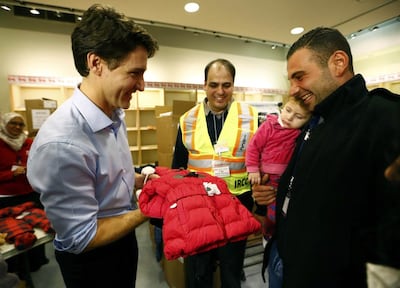The only surprising thing about the saga of Soufi’s restaurant in Toronto, in this age of xenophobia, walls and hatred, is that it has a happy ending.
Soufi's highlights the entrepreneurial spirit of the Syrian community and the success of Toronto's experiment with integration three years after Canada decided to open its doors to thousands of Syrian refugees.
Last month, however, weeks before the Canadian federal elections, the popular downtown eatery had to shut down after it received numerous death threats. However, due to an outpouring of support from Canadians and political leaders, the owners later reversed course and reopened the restaurant.
The episode exemplified risks and alienation that immigrants and refugees face daily, as well as the capacity of right-wing extremists to spread terror. But it also highlighted stereotypical, one-dimensional narratives. Often well-intentioned, these stories pigeonhole new arrivals as grateful members of a community that remains at arm's length and subjected to a subtle form of othering that in extreme cases leads to a backlash like Soufi’s experienced.
Let’s back up a little. In 2015, Prime Minister Justin Trudeau directed his government to resettle thousands of Syrian refugees who were fleeing four years of internecine war and terror. Many had languished for years in refugee camps in Turkey, Lebanon and Jordan, escaping Syrian president Bashar Al Assad’s barrel bombs and chemical weapons and ISIS savagery.
The flight of so many people to safer shores in Europe sent shockwaves through the international community, fuelling the rise of xenophobic far-right nationalism in the West. US President Donald Trump was elected on promises to build walls and shut down Muslim immigration to the United States.

In Canada, the most horrific embodiment of far-right hatred was a shooting at a mosque in Quebec City in January 2017 by an anti-immigrant university student that killed six people.
In the 2019 federal elections, a new formation called the People’s Party of Canada (PPC), led by Maxime Bernier, ran a campaign hinged on anti-immigration, anti-multiculturalism and anti-crony capitalism. The party sought to emulate Mr Trump's politics. Happily, this may be the last you hear of Mr Bernier as Canadians thoroughly rejected his party. No members were elected and Mr Bernier lost his own seat.
The reason Soufi’s was targeted was because the owner’s son, Alaa Al Soufi, took part in an “antifa” protest in the city of Hamilton against Mr Bernier (Soufi’s owners are immigrants but many of their staff are refugees). Mr Al Soufi appeared in a video alongside other protesters who tried to block an elderly woman from attending an event for Mr Bernier. Other protesters are seen yelling at the woman.
After Mr Al Soufi was identified by Mr Bernier's supporters online and his personal details released, his family’s restaurant began receiving death threats. The difference between Canada and other western first-world nations is that leaders on all sides of the political spectrum condemned the behaviour of the PPC’s trolls, who appeared to be more numerous than Mr Bernier’s actual supporters.
But looking beyond the behaviour of Mr Al Soufi and the antifa protesters (he obstructed the path of the elderly woman but stayed silent even as the others shouted at her), it is worth noting that the actions of one immigrant were immediately seized by Mr Bernier’s trolls who generalised them to apply to the larger Syrian community and target a restaurant that the Soufi family had toiled for years to build. For Mr Bernier’s trolls, Mr al-Soufi had dared to raise his voice, not content to know his place.
In an essay in the Guardian, Dina Nayeri, an Iranian refugee who settled in the US and UK, described this imperative to be silent: "If I failed to stir up in myself enough gratefulness, or if I failed to properly display it, I would lose all that I had gained, this western freedom, the promise of secular schools and uncensored books… The refugee has to be less capable than the native, needier; he must stay in his place. That's the only way gratitude will be accepted. Once he escapes control, he confirms his identity as the devil."
This narrative of the grateful, hard-working refugee is all-pervasive. Stories such as the one from 2016 of the tailor from Aleppo who became the lifeline of a Canadian wedding when he used his sewing kit to fix a tear in the bride's dress appear with some regularity. It is as though facile reminders of the humanity of Syrians will lead sceptics to empathise with their predicament and open doors to those fleeing conflict. Refugees are easily scapegoated during tough economic times despite their well-documented contributions to the economy. This is the case in Turkey, where refugees went from being brothers and guests to being blamed for a downturn directly caused by the government’s disastrous economic policies.
Many Syrians, as well as refugees and migrants of all stripes, owe their lives and well-being to the fact that Canada, Germany and other nations opened their doors to them at their moment of most dire need. But they are not servile foils to western generosity.
In the greater sum of it all, they will help build great things and their new homes will be richer for their presence. And their voices will be heard.


